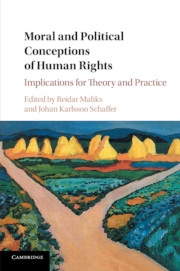Part II
Published online by Cambridge University Press: 27 July 2017
Summary

- Type
- Chapter
- Information
- Moral and Political Conceptions of Human RightsImplications for Theory and Practice, pp. 155 - 298Publisher: Cambridge University PressPrint publication year: 2017



